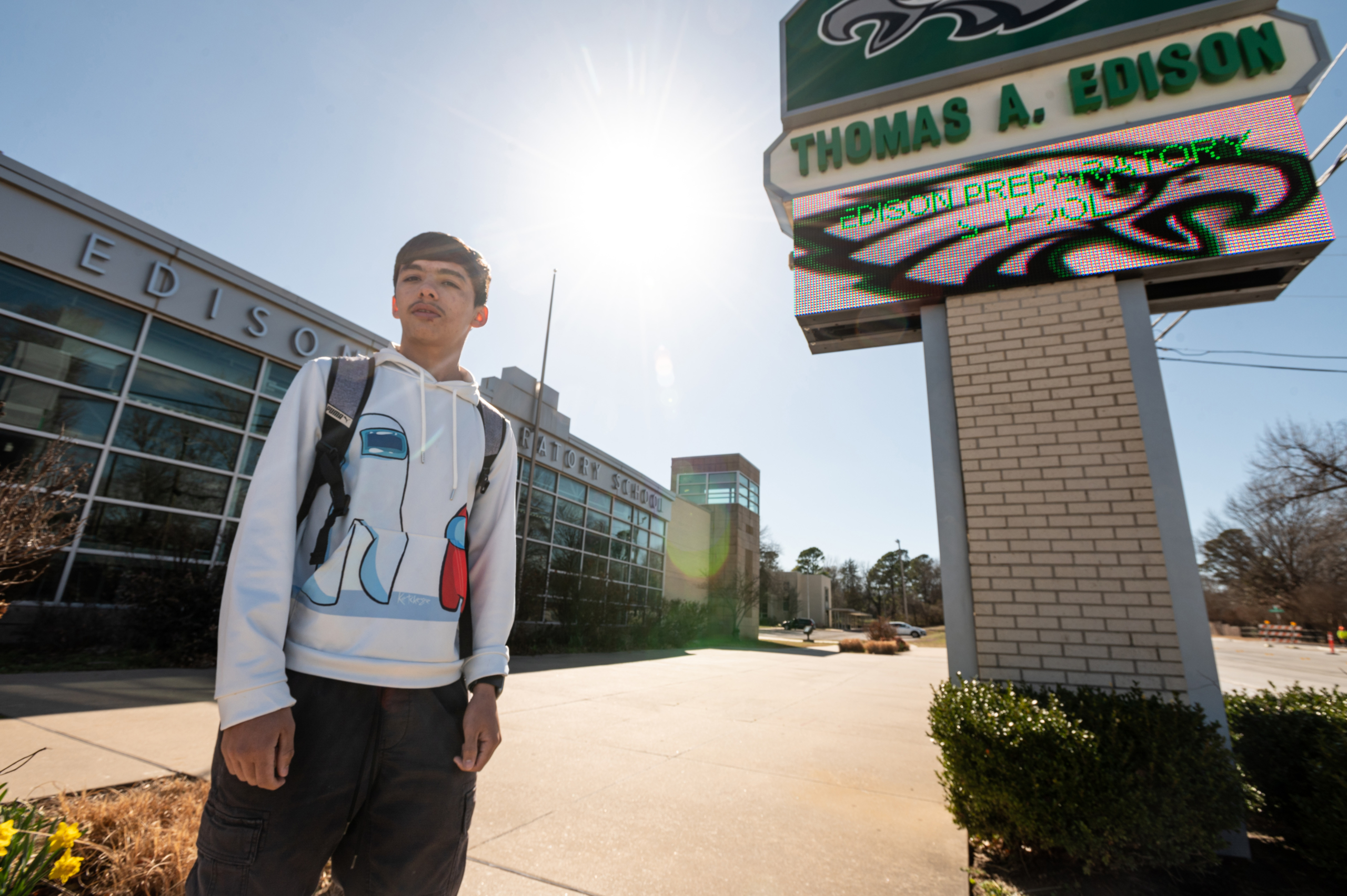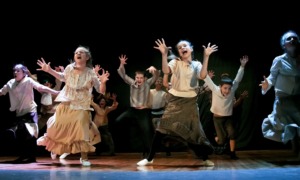TULSA, Okla. — During a recent visit to a large urban park a few miles from his home in Tulsa, 17-year-old Shahrukh Khalilbeak pushed his brothers and sisters on a swing and shimmied up a climbing structure, looking relaxed as he posed for photos while trying to maintain his balance.
It was a brief reprieve for Shahrukh, who, in addition to juggling school, learning to drive and his job at a local ice cream shop, is also the main translator and guide for his parents and five younger siblings as they navigate life in a new country after fleeing Afghanistan.
Translating used to be a challenge, he said, but now, “it’s like a habit.”
Despite the tremendous responsibility that’s been thrust on the teen, Shahrukh insists he feels a desire — not pressure — to help his family.
“It’s my turn,” he said.
More than 76,000 Afghans have arrived in the United States since the Taliban seized complete control of the country in August, 2021. They join about 97,000 who were resettled in the U.S. over the last two decades since the American invasion. The United Nations estimates six million Afghans have been forcibly displaced from their homes, the vast majority internally or to neighboring Iran and Pakistan.
The Khalilbeaks are among more than 850 Afghans who have settled in Tulsa and the nearby city of Stillwater recently. About half of those people are under the age of 18, said Robin Thoendel, the director of human resources and administration at Catholic Charities of Eastern Oklahoma, one of the organizations that works with refugees locally.
Children and teenagers are often able to learn a new language and customs more easily than their parents, which smoothes their transition but also places them in a position of responsibility for the rest of the family.
“This is a dynamic that’s not uncommon in lots of different types of migration, especially where language is an issue,” said Sarah Dryden-Peterson, an associate professor of education at Harvard University and author of the book, “Right where we belong: How refugee teachers and students are changing the future of education.”
“Young people are kind of taking on a family role that is outward-facing, and being that kind of broker between social services or schools and families,” she said.
Challenges facing the Khalilbeaks and other refugee families in Tulsa include a lack of reliable transportation; language and cultural differences; and unfamiliar education systems and standards.
But the biggest hurdle right now for Shahrukh’s family, he said, is money.
“Money is family. Money is respect. Money is everything,” he said. “If we have money, we can buy a car and solve our problems.”
A harrowing journey to leave home
In Afghanistan, Shahrukh’s father, Sakhidad Khalilbeak, worked for the U.S. government as a truck driver, hauling materials between provinces. Because of that, he and his family were eligible to seek refuge in the U.S.
Forozaan Mohammadi, Shahrukh’s mother, was a midwife. When the Taliban swept across the country in the wake of the withdrawal of U.S. forces, she was pregnant.
Shahrukh watched the news from their home in Kabul with concern as one province after another fell under their control.
“It was very fast,” Shahrukh said of the Taliban’s takeover.
Amid the chaos that followed the fall of the capital, the family heard President Joe Biden say that those who helped the U.S. government could seek refuge, and they rushed to the airport.
They waited there for several days. Shahrukh and his parents stayed awake the entire time, fretting, while the younger children slept. They didn’t know whether they would be allowed to board a plan, but if they left the airport, they could be killed.
“If we didn’t go to America, where would we go?” Shahrukh recalled.
Finally, the family was ushered on board the first of several flights that would take them from Kabul to Qatar, Germany, Philadelphia and Texas, before finally arriving in Tulsa in fall of 2021.
Along the way, Shahrukh found pride and purpose in making himself useful. He translated information from the flight crews over the intercom to hundreds of anxious fellow Afghans, who thanked him.
“That made me happy,” he said, “because I helped my people.”
He also got to sit in a pilot seat. A picture from that day shows a wide smile on his face, conveying the joy and optimism he said he felt. The moment left a lasting impression on Shahrukh, who has dreamed of becoming a pilot ever since.
A new school and a new life in Tulsa
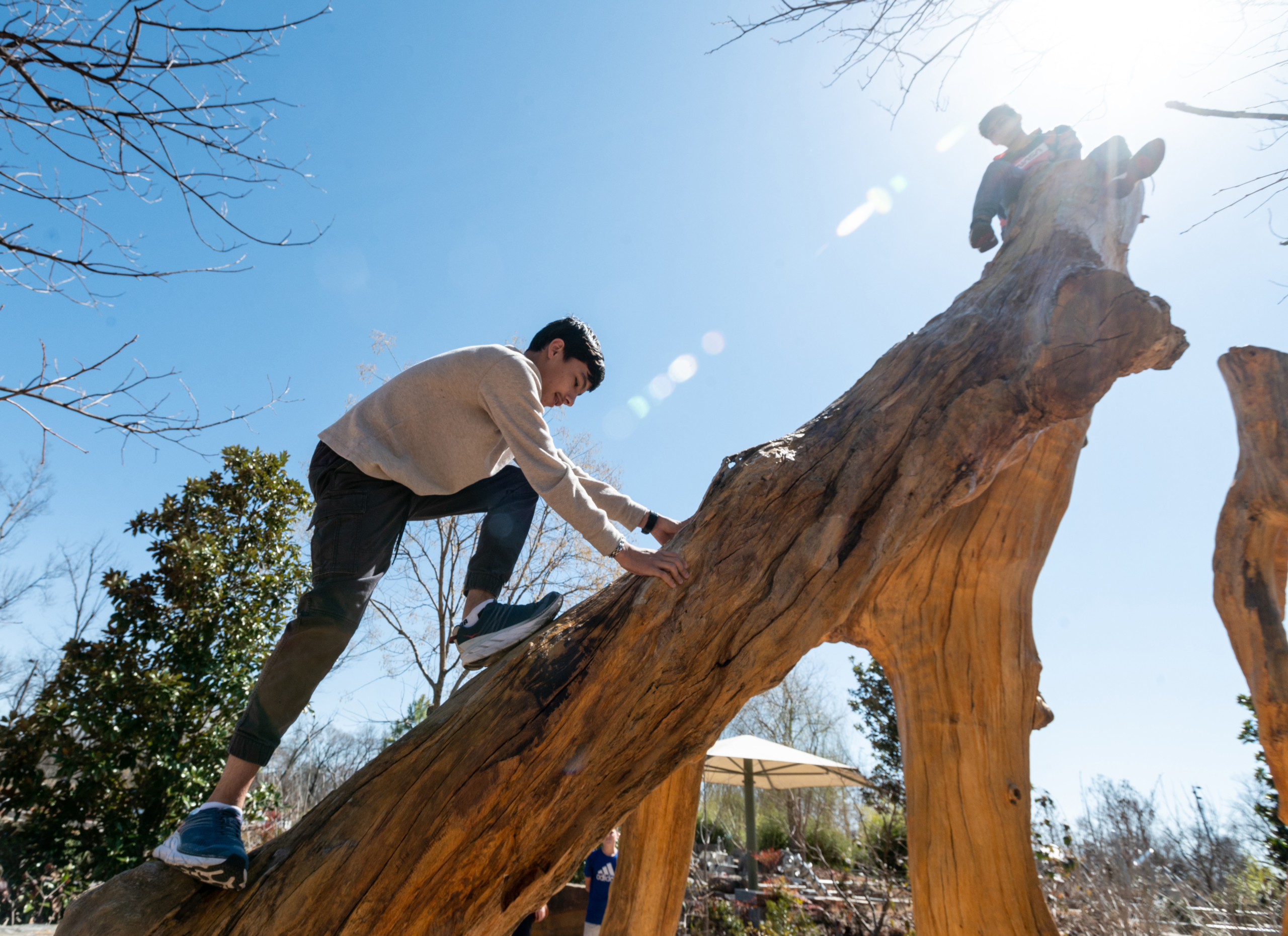
Melissa Lukenbaugh
Shahrukh climbs the play structures at Tulsa’s Gathering Place as his brother, Farshad looks on from above. It was a rare moment of play for the teen, who studies, works and is learning to drive.
Upon their arrival in Tulsa, the family was welcomed by Catholic Charities, which helped them find housing and jobs, and set the kids up in school.
Sakhidad now works in the engineering department at a local manufacturer of heating and cooling supplies. Forozaan, meanwhile, is learning English and taking care of the new baby, Ferdows, born in the U.S. after their arrival.
Shahrukh and his siblings have enrolled in Tulsa public schools along with more than 300 other recently-arrived Afghan students in pre-kindergarten to 12th grade, according to Laura Grisso, executive director of language and cultural services at Tulsa Public Schools.
“Schools in the U.S. are very different than those in Afghanistan, including schedules, norms, cafeteria, etc.,” Grisso wrote in an email. “We work closely with the parents and students to understand expectations and structures in school to help their students and families be successful.”
Once enrolled in school, the new students are each given a laptop, headset, backpack, school supplies and bilingual dictionaries and books in English and Pashto or Dari, the main languages spoken in Afghanistan.
While there are many differences between Shahrukh’s school in America and the one he attended in Kabul — classes are mixed gender here, and everyone uses a laptop — he has forged friendships with classmates from a variety of backgrounds.
They mainly talk about class assignments and some of Shahrukh’s new friends are teaching him to drive, he said.
Not all the Afghan students are adjusting as well.
“As students have transitioned, some have shown signs of trauma while in school,” wrote Grisso.
Grisso said that at the elementary level, they have seen this manifest in students having difficulty staying in the classroom or staying on task. One regularly goes to another classroom to check on her cousins.
“The culture is collectivist, with strong family ties, so there is a tight family group responsibility,” Grisso wrote.
Older students, meanwhile, may become frustrated or show strong emotions, she said.
“In both cases, our student and family support teams and school wellness teams have worked with students, teachers and parents to build trust [and] create safe spaces for ‘breaks’ or for them to meet with other refugee students in the school to support them emotionally as they work through these transitions and changes,” Grisso wrote.
Dryden-Peterson, the Harvard professor, said it’s important to ask refugee youth what they need to be successful in a new environment.
Schools and other support systems should make sure they “don’t inherently impose … American values of what young people should and shouldn’t do on a family who may not have those same values, and who may actually see this kind of a process as an inherently productive one for a family to create that kind of pathway together,” she said.
Taking on so many new responsibilities after surviving conflict and displacement may seem to some like a burden on youth, she said.
“But in fact, for people who are doing that kind of supporting, it can also feel like an essential way of contributing, not only to oneself, but also to a broader community that one deeply cares about,” she added.
Saving for a car
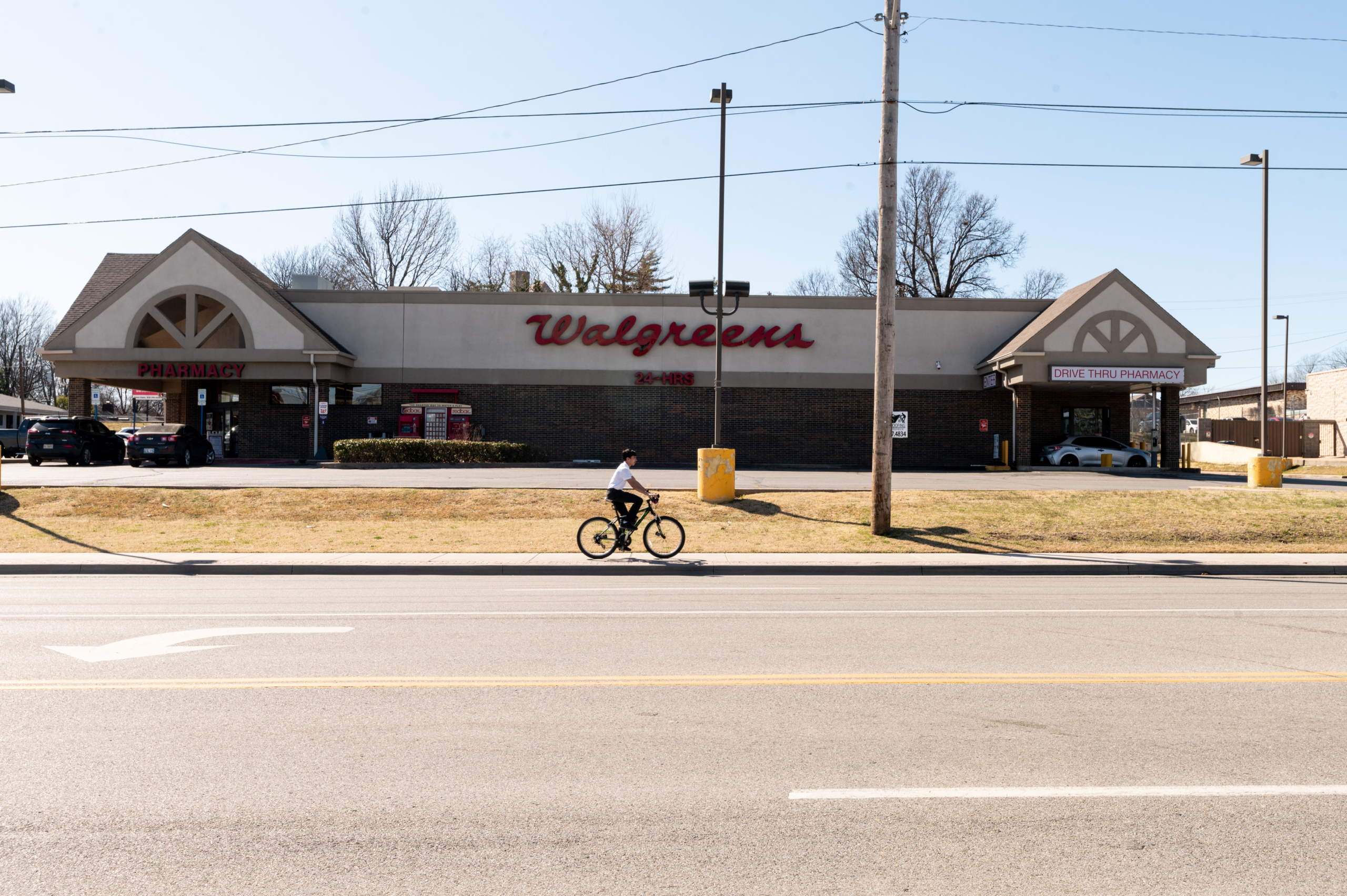
Melissa Lukenbaugh
Shahrukh rides his bike on Tulsa streets to work at Braum’s Ice Cream and Dairy Store, less than a mile from his family’s house. Unreliable transportation is a major challenge for newly-arrived Afghans, and Shahrukh is saving his money for a car.
In addition to the challenges of providing emotional support to traumatized youth, the school district has also been working to overcome logistical issues around transportation.
Bus service is not provided if a student lives within two miles of the school, but the majority of Afghan parents do not have driver’s licenses or cars yet.
“Our transportation team has been great in creating new bus stops as needed and when feasible,” Grisso said. “With all of that though, we haven’t been able to reconcile all of the transportation issues when families live within the two mile radius and we are continuing to work with them to find an effective and sustainable solution.”
Transportation is a major obstacle for many newcomers, and it affects more than school.
The Khalilbeak kids take the bus to school, but the family relies on volunteers to drive them to many places, including to doctor’s appointments and the grocery store. Shahrukh uses a bicycle to get to his job at Braum’s Ice Cream and Dairy Store, which is less than a mile away.
But he is working hard, with the help of his new friends, to get his license so he can fill that role for his family as well. In a video on his phone, Shahrukh can be seen guiding a car slowly through a parking lot as the voices of his friends offer encouragement and caution.
“I like to drive because we need it,” Shahrukh said, adding that he needs to be able to get his sisters to school.
The trouble, he said, will be how to pay for a car.
“The driving test is easy,” he said. “Having a car is expensive. I just want to save my money to buy a car.”
The city of Tulsa has made some modest efforts to make it easier for some resettled Afghans to get around.
“[T]he City of Tulsa strives to be a welcoming and inclusive city for all residents and our immigrant communities,” Mayor G.T. Bynum said in a statement announcing subsidized driver’s education classes and bus passes for some resettled Afghans.
Reconciling the past and future
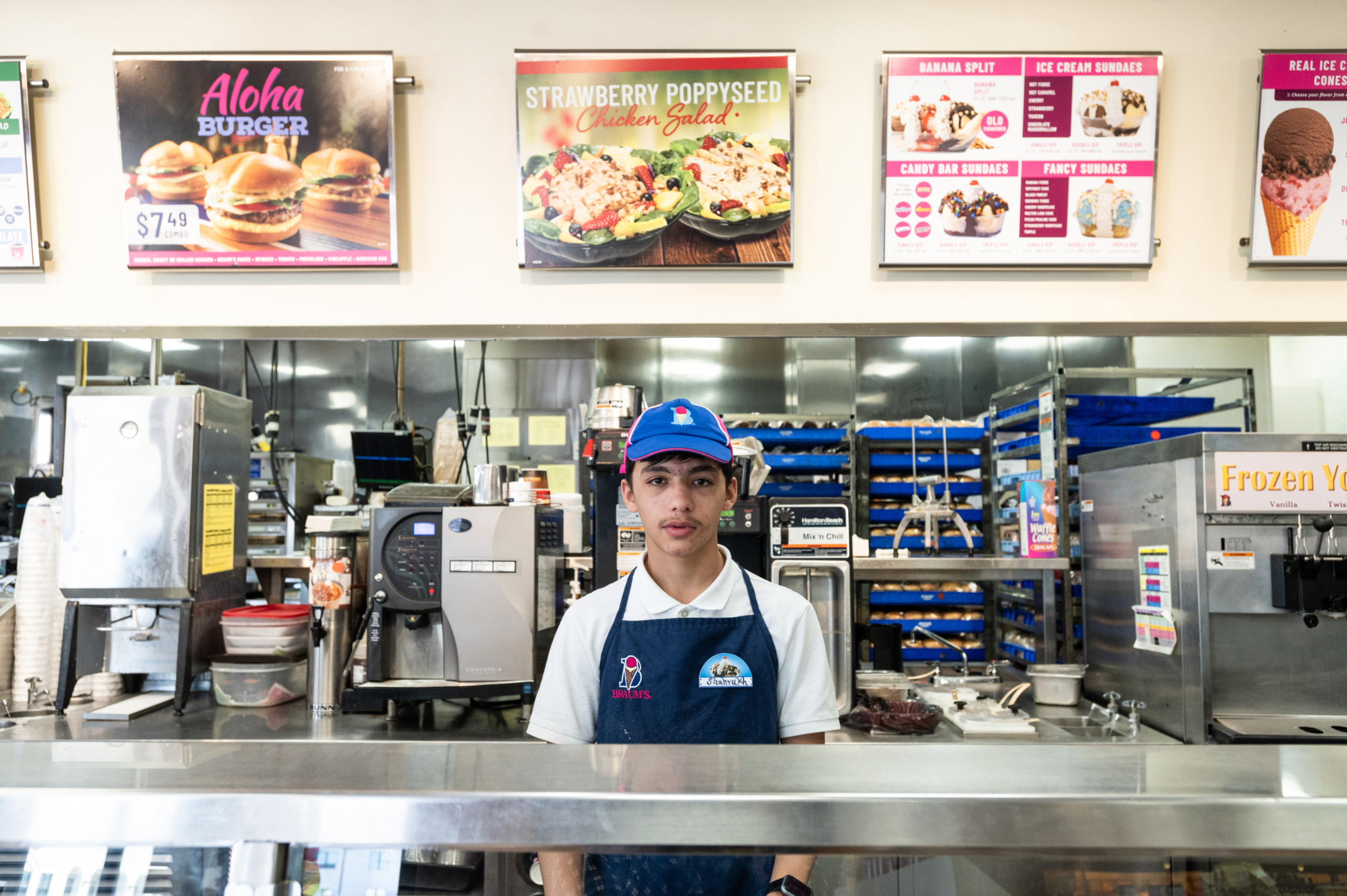
Melissa Lukenbaugh
Shahrukh waits to take his next ice cream order on his work shift at Braum’s Ice Cream and Dairy Store in Tulsa, Oklahoma. He said he is happy with his boss, who shifted his schedule to accomodate his fasting during Ramadan.
Between work, school and family, Shahrukh stays busy. He’s close with his family and helps out with his younger siblings. He’s found friends at school, and an understanding boss at the ice cream shop who shifted his schedule to accommodate his fasting during Ramadan.
Shahrukh maintains his connections to family in Afghanistan — two grandmothers, a grandfather, aunts and uncles — using video chat, but he doesn’t feel the same loss as his parents, he said.
“I have my family,” he said. “But for my mom, it’s hard.”
Shahrukh’s goal is to earn his pilot’s license in the next five years. He worries about paying for flight school, and is working hard in school in hopes of earning a scholarship.
Asked if he was happy, he expressed ambivalence. The cultural differences seemed to weigh on him.
“I see very [big] differences, like, about respect,” he said. In Afghanistan, people “respect each other a lot,” Shahrukh said, but he felt Americans were quick to get angry and jump to conclusions.
Despite his misgivings, Shahrukh sees a bright future for himself and his family in the U.S.
“I’m happy … because I’m here, because I can learn more stuff,” he said. “I can be a pilot here, because here, everything is possible.”
***
Kristi Eaton is an Oklahoma-based freelance reporter, writer and communicator. Her work has appeared in The New York Times, The Associated Press, The Washington Post and elsewhere. Visit her website at KristiEaton.com or follow her on Instagram or Twitter @KristiEaton.
Melissa Lukenbaugh is an award-winning photographer and filmmaker who has covered conservation, homelessness, mental health, gender equity and the HIV and AIDS pandemic. Based out of Tulsa, Oklahoma, she is currently pursuing any and all work on rock, snow, sand, ice or bike.
***
Correction: An earlier version of this story misspelled Forozaan Mohammadi’s name. This story has been updated with the correct spelling.
Editor’s note, June 29, 2023: Photos of Shahrukh Khalilbeak’s relatives were removed from this story at their request.


